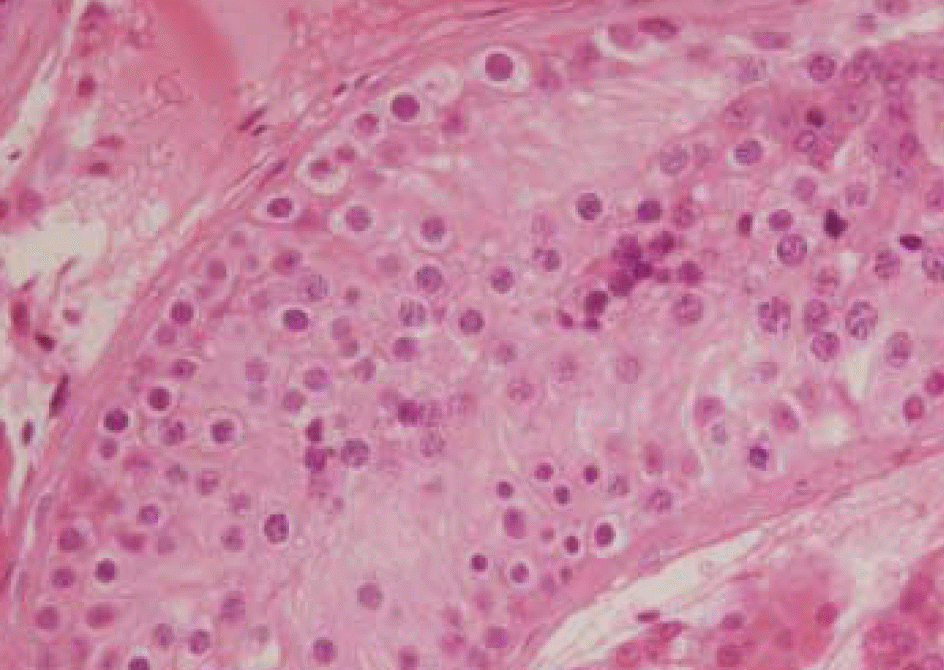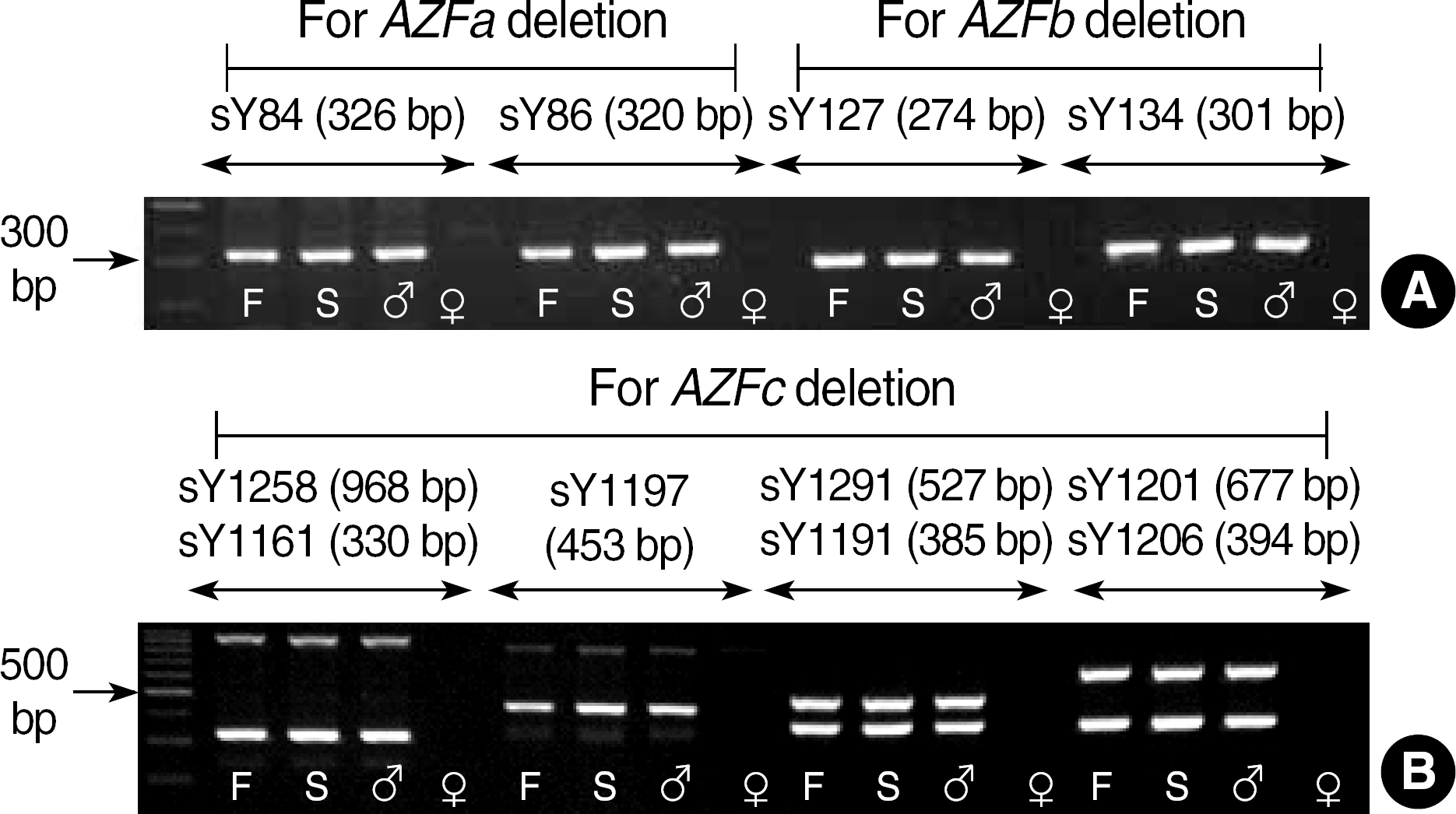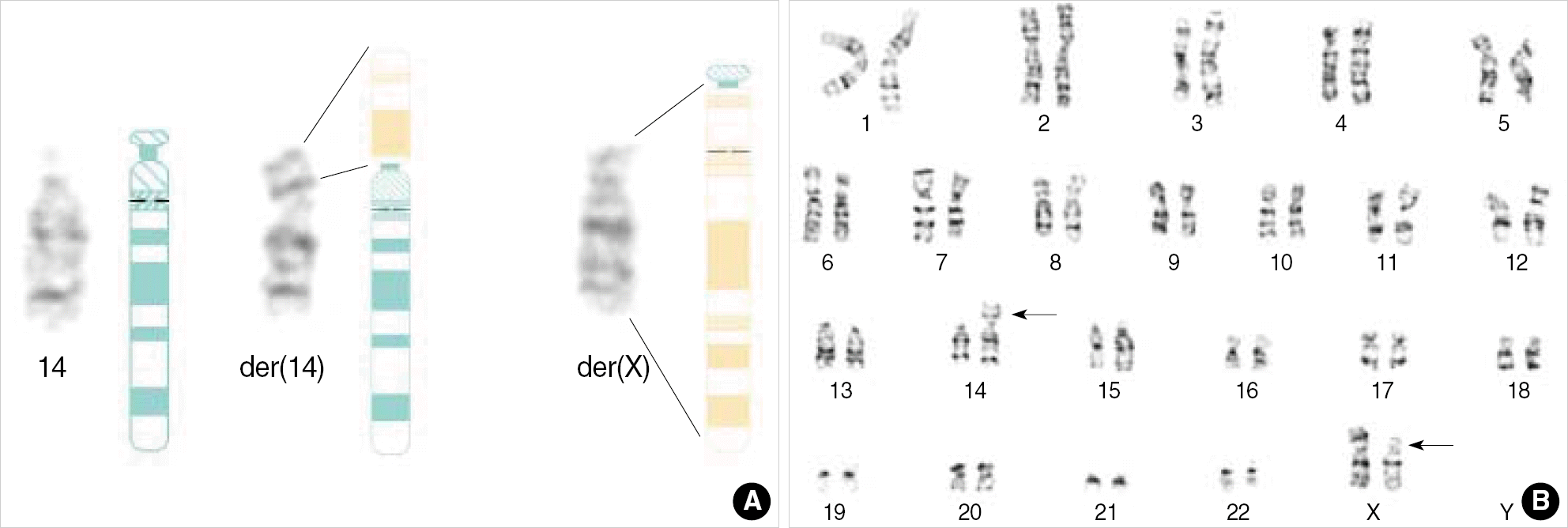Abstract
A chromosomal abnormality was found in about 3.6–7.6% of males presenting with azoospermia or oligospermia. Translocations between X chromosome and autosomes are rarely seen genetic disorders that cause male infertility. We described here a 26-year-old infertile male with t(X;14)(p11.4;p12). He showed a normal phenotype without any familial history of congenital abnormalities. The cytogenetic analysis of the proband revealed an X-autosomal translocation, 46,Y,t(X;14)(p11.4;p12), which was inherited from his mother. The testis biopsies indicated the arrest of spermatogenesis. There were no microdeletions of the azoospermia factor a (AZFa), AZFb and AZFc regions in the Y chromosome shown by PCR with 11 sequence-tagged site (STS) markers. According to the literature, male carriers of an X-autosome translocation are invariably sterile, regardless of the position of the break-point in the X chromosome. To our knowledge, this is the first case report of azoospermia with t(X;14)(p11.4;p12) in Korea.
Go to : 
References
1. Foresta C, Ferlin A, Gianaroli L, Dallapiccola B. Guidelines for the appropriate use of genetic tests in infertile couples. Eur J Hum Genet. 2002; 10:303–12.

2. Kuroda-Kawaguchi T, Skaletsky H, Brown LG, Minx PJ, Cordum HS, Waterston RH, et al. The AZFc region of the Y chromosome features massive palindromes and uniform recurrent deletions in infertile men. Nat Genet. 2001; 29:279–86.

3. Simoni M, Bakker E, Krausz C. EAA/EMQN best practice guidelines for molecular diagnosis of y-chromosomal microdeletions. State of the art 2004. Int J Androl. 2004; 27:240–9.

4. Repping S, Skaletsky H, Brown L, van Daalen SK, Korver CM, Pyntikova T, et al. Polymorphism for a 1.6-Mb deletion of the human Y chromosome persists through balance between recurrent mutation and haploid selection. Nat Genet. 2003; 35:247–51.

5. Pandiyan N, Jequier AM. Mitotic chromosomal anomalies among 1210 infertile men. Hum Reprod. 1996; 11:2604–8.
6. Bourrouillou G, Mansat A, Calvas P, Pontonnier F, Colombies P. Chromosome anomalies and male infertility. A study of 1,444 subjects. Bull Assoc Anat (Nancy). 1987; 71:29–31.
8. Johnson MD. Genetic risks of intracytoplasmic sperm injection in the treatment of male infertility: recommendations for genetic counseling and screening. Fertil Steril. 1998; 70:397–411.

9. Gekas J, Thepot F, Turleau C, Siffroi JP, Dadoune JP, Briault S, et al. Chromosomal factors of infertility in candidate couples for ICSI: an equal risk of constitutional aberrations in women and men. Hum Reprod. 2001; 16:82–90.

10. Lissitsina J, Mikelsaar R, Punab M. Cytogenetic analyses in infertile men. Arch Androl. 2006; 52:91–5.

11. Quack B, Speed RM, Luciani JM, Noel B, Guichaoua M, Chandley AC. Meiotic analysis of two human reciprocal X-autosome translocations. Cytogenet Cell Genet. 1988; 48:43–7.

12. Kalz-Fuller B, Sleegers E, Schwanitz G, Schubert R. Characterisation, phenotypic manifestations and X-inactivation pattern in 14 patients with X-autosome translocations. Clin Genet. 1999; 55:362–6.
13. Schmidt M, Du Sart D. Functional disomies of the X chromosome influence the cell selection and hence the X inactivation pattern in females with balanced X-autosome translocations: a review of 122 cases. Am J Med Genet. 1992; 42:161–9.

14. Maraschio P, Tupler R, Dainotti E, Cortinovis M, Tiepolo L. Molecular analysis of a human Y;1 translocation in an azoospermic male. Cytogenet Cell Genet. 1994; 65:256–60.

15. Paoloni-Giacobino A, Kern I, Rumpler Y, Djlelati R, Morris MA, Dahoun SP. Familial t(6;21)(p21.1;p13) translocation associated with male-only sterility. Clin Genet. 2000; 58:324–8.

16. Panasiuk B, Usinskiene R, Kostyk E, Rybalko A, Stasiewicz-Jarocka B, Krzykwa B, et al. Genetic counselling in carriers of reciprocal chromosomal translocations involving short arm of chromosome X. Ann Genet. 2004; 47:11–28.

17. Gardner R, Sutherland G. Chromosome abnormalities and genetic counseling. 3rd ed.New York: Oxford University Press;2004. p. 105–7.
Go to : 




 PDF
PDF ePub
ePub Citation
Citation Print
Print





 XML Download
XML Download